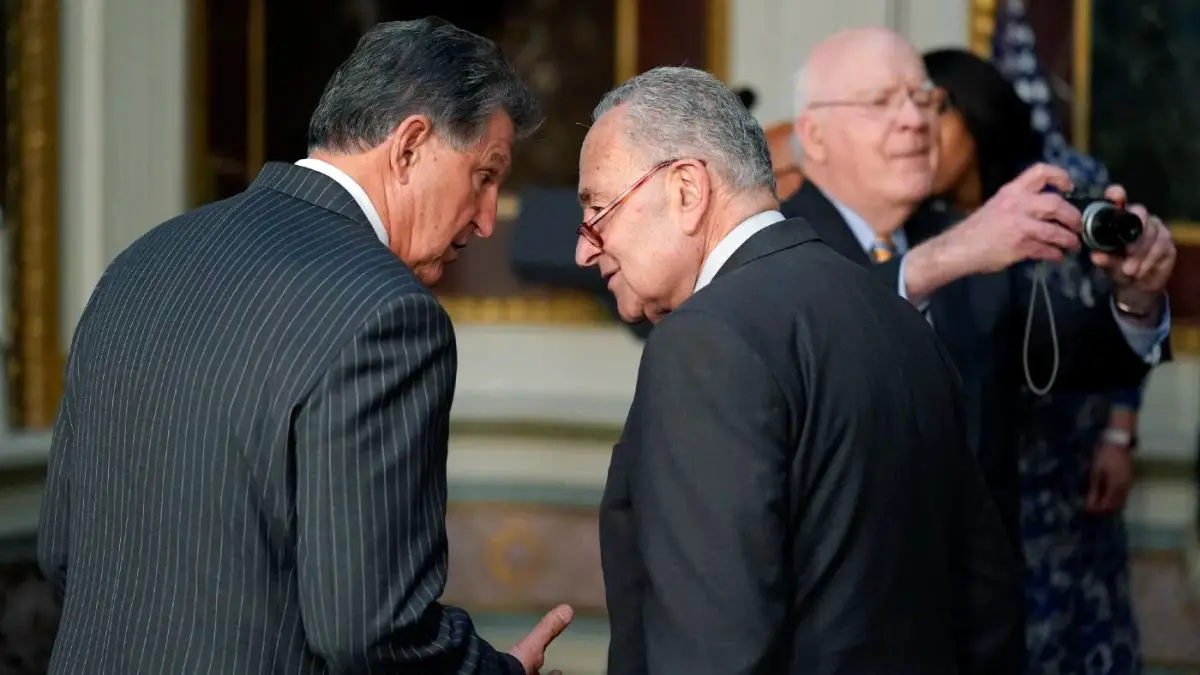Alternate headline: Manchin caves on inflation fears
For all the fuss and heartburn Sen. Joe Manchin has caused for his own party by holding up their spending bills, he recently threw all of it to the wayside in supporting a deal with Sen. Majority Ldr. Chuck Schumer to pass a $700 billion spending bill dubbed the “Inflation Reduction Act.”
The irony in the name of the bill is that government spending is usually the wrong tool for trying to reduce inflation. This is especially considering the fact that much of the current inflation can be blamed directly on Biden’s spending when he first took office in 2021.
A report out on Friday indicated that the Manchin-Schumer deal may cause a short-term inflation bump helping to fuel Bidenflation for the foreseeable future:
The Friday report by the Penn Wharton Budget Model estimated that the bill “will produce a very small increase in inflation for the first few years, up to 0.05 percent points in 2024,” potentially delivering a new blow to President Biden’s agenda.
“We estimate a 0.25 percentage point fall in the PCE price index by the late 2020s,” the analysts added. “These point estimates, however, are not statistically different than zero, thereby indicating a very low level of confidence that the legislation will have any impact on inflation.”
The budget model also suggested that the bill would have little effect on the rest of the US economy, with no impact on gross domestic product forecast for the 10 years its provisions would be in effect — and just a 0.2% increase in GDP predicted by 2050.
The legislation, for its so-called “meager” $700 billion price tag, is being touted as a “major” victory for Biden. That’s pertinent since practically anything passed by Congress at this point resembling Biden’s agenda would be considered a victory since Biden’s own party kept derailing his plans.
The bill will toss more money into the economy on Democratic pet projects like wind and solar:
The legislation, which would subsidize purchases of environmentally friendly technologies and increase taxes on wealthy people and businesses, came seven months after Manchin pulled the plug on initial spending negotiations, citing soaring inflation.
The new package — a pared-back version of Biden’s Build Back Better Act — includes $433 billion in new spending, offset in theory by $739 billion in tax increases. The difference would be put toward paying down the federal budget deficit.
In other words, will Biden be pouring billions of dollars into green-energy programs like Solyndra, the poster child for government slush spending on new green technology? Whenever the government gets involved in picking winners and losers, it usually helps create the losers by propping up markets or companies that private equity didn’t see fit to fund. If there’s money to be made investors will follow.
Why did Manchin cave? The effort to turn the West Virginia Senator’s neck was multi-pronged and relentless, according to reports:
The people involved who spoke with POLITICO described an effort with multiple entry points. They said Manchin’s staff was eager to set up meetings and kept conversations going to assuage their boss’ concerns about inflation, supply chains and energy.
“I am absolutely aware that many, many folks called Manchin, and many corporate leaders wanted to get this done,” said one environmental group leader involved in the outreach, requesting anonymity to discuss sensitive dynamics given that the legislation has not yet passed.
In essence, they wore him down to the point where he was willing to give in. On the other hand, Manchin wore his opponents down as well by only agreeing to a bill in the $700 billion range compared to $4 trillion or whatever insane price tag Democrats were putting on the Build Back Better framework.
Manchin gave Biden his small victory before the midterms. If history is a guide, very few voters will actually be aware of it. According to polling, 76% of voters still don’t know that the Biden infrastructure bill ever passed.
Donate Now to Support Election Central
- Help defend independent journalism
- Directly support this website and our efforts
